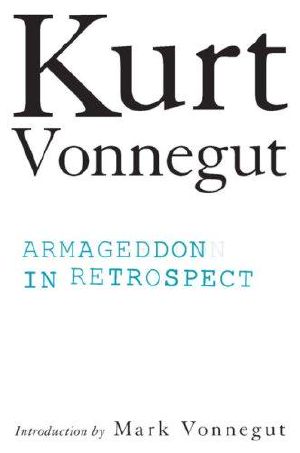Armageddon In Retrospect

- Authors
- Kurt Vonnegut
- Publisher
- New York : G.P. Putnam's, c2008.
- ISBN
- 9780399155086
- Date
- 2009-04-07T04:00:00+00:00
- Size
- 0.33 MB
- Lang
- en
Amazon.com ReviewThe first and only collection of unpublished works by Kurt Vonnegut since his death--a fitting tribute to the author, and an essential contribution to the discussion of war, peace, and humanity's tendency toward violence.
Armageddon in Retrospect is a collection of twelve new and unpublished writings on war and peace. Imbued with Vonnegut's trademark rueful humor, the pieces range from a visceral nonfiction recollection of the destruction of Dresden during World War II--an essay that is as timely today as it was then--to a painfully funny short story about three Army privates and their fantasies of the perfect first meal upon returning home from war, to a darker, more poignant story about the impossibility of shielding our children from the temptations of violence. Also included are Vonnegut's last speech as well as an assortment of his artwork, and an introduction by the author's son, Mark Vonnegut. Armageddon in Retrospect says as much about the times in which we live as it does about the genius of the writer.
Read an Unreleased Kurt Vonnegut Story, "Guns Before Butter"
"Guns Before Butter," Kurt Vonnegut's story of hungry GIs held as prisoner of war in World War II in Dresden (a site of Vonnegut's best-known novel, Slaughterhouse-Five, and his own wartime imprisonment), was unpublished until its inclusion in Armageddon in Retrospect. Read the complete story
Kurt Vonnegut Sketchbook
Click through on the images below to see samples of the artwork included in Armageddon in Retrospect:
From Publishers WeeklyStarred Review. When Kurt Vonnegut died in April 2007, the world lost a wry commentator on the human condition. Thanks to this collection of unpublished fiction and nonfiction, Vonnegut's voice returns full force. Introduced by his son, these writings dwell on war and peace, especially the firebombing of Dresden, Germany. The volume opens with a poignant 1945 letter from Pfc. Kurt Vonnegut Jr. to his father in Indianapolis, presenting a vivid portrait of his harrowing escape from that city. The fiction, full of his characteristic humor, includes stories about time travel and the impossibility of peace in the world (Great Day) and, in the title piece, a kind of mock Paradise Lost, Dr. Lucifer Mephisto teaches his charges about the insidious nature of evil and the impossibility of good ever triumphing. In his final speech, Vonnegut lets go some of his zingers (jazz is safe sex of the highest order) and does what he always did best, tell the truth through jokes: And how should we behave during the Apocalypse? We should be unusually kind to one another, certainly. But we should also stop being so serious. Jokes help a lot. And get a dog, if you don't already have one. So it goes. (Apr.) Copyright © Reed Business Information, a division of Reed Elsevier Inc. All rights reserved.